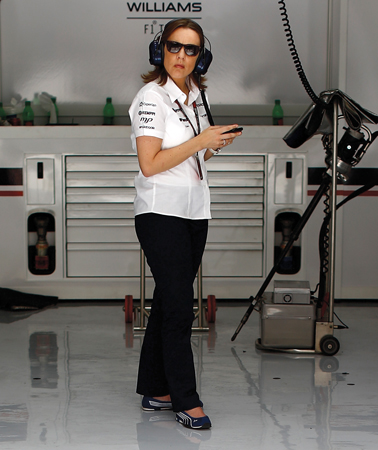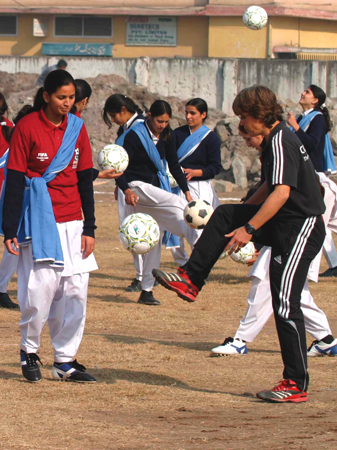Claire Williams
Deputy team principal, Williams F1
Claire Williams’ appointment as deputy team principal at Williams F1 in March was a rare occurrence in the world
 |
Claire Williams has found a home for herself in the male-dominated world of Formula One racing.
Photo by: Getty Images |
of Formula One. She is one of only two women, along with Sauber F1’s Monisha Kaltenborn, to hold the role.
In an environment as male-dominated as F1, Williams understands the importance of her role and stressed the need for more female role models.
“It’s all about providing that example,” she said. “As more women come forward and take more leadership roles, it will in turn inspire other girls to see that it can be done.”
Williams is proud to count Susie Wolff, F1’s only female driver, as a part of the Williams F1 team and a prime example of the sport’s slow shift in gender roles.
“[Wolff] can demonstrate that she has gone up against the boys and has been successful,” Williams said. “That will, in itself, breed more girls to come out for the sport.”
Williams’ father, Frank Williams, is the founder of Williams F1 and team principal.
Williams’ primary role is to ensure that the team has the necessary budget to compete. As an independent team without a major backer, Williams F1 relies on its partners and the commercialization of its technology to generate its racing funds. Williams describes her days as “quite manic,” often filled with commercial meetings to secure partners and sponsors.
“There’s a lot of competition for sponsorship dollars out there. There are hundreds of rights holders that all have amazing offers that we’re competing against, in the social and digital space. It’s a tough world out there, but in order to make sure that you meet your budget, you just have to work harder and smarter than your competition.”
Monika Staab
Women’s national team coach, Qatar
In the last 20 years, the German women’s national football team has made its mark as one of the world’s top teams.
 |
Staab teaches soccer in Pakistan during a stint as the country’s national coach.
Photo by: Getty Images |
The team boasts two World Cup titles and has won eight of the 11 UEFA Championships.
While the country is now a leading powerhouse in the realm of women’s soccer, Monika Staab can recall a time when the sport was only for men, with little to no access for female players.
“If you asked a man why a woman can’t play football, you would get the answer, ‘She is a crystal, and when you play football, a crystal will break,’” said Staab. “But not every woman is a crystal. My answer is, ‘I’ve been a woman for 54 years, and I haven’t broken yet.’”
For more than 30 years, Staab has been a pioneer for women’s football. Her time as the manager for 1. FFC Frankfurt from 1993-2004 allowed her to have a direct impact on the growth and development of women’s football in Germany. After witnessing the success of the women’s national team, Staab decided it was time to help grow the sport in other countries.
In 2007, she joined FIFA as the national women’s coach for Bahrain. After six months in Bahrain, followed by four months in Pakistan as the country’s national coach, Staab became a highly sought after consultant and instructor for the development of women’s soccer in the Middle East and Asia, a role that has taken her to 63 countries in the last five years. Staab is the women’s national coach of Qatar, a position she’s held since the end of February.
In a country where it is common for the men to make the decision regarding a woman’s future, Staab once again faces the task of convincing the men that football can be beneficial to women.
“I faced it 43 years ago in Germany, and now I have it again here in Qatar. I’m starting from scratch to convince all the men that women’s football is OK.”
Nawal El Moutawakel
Vice president, IOC Executive Committee
As a young girl, running through the streets of Casablanca, Morocco, Nawal El Moutawakel was an anomaly in a
 |
El Moutawakel has championed the cause of female equality in the Arab world.
Photo by: Getty Images |
region lacking in stadiums and female athletic teams. Her speed soon caught the eyes of coaches who groomed her to compete in the inaugural women’s 400m hurdles event at the 1984 Los Angeles Olympics, where she became the first Arab Muslim woman to win Olympic gold.
Thirty years after her historic win, El Moutawakel continues to break gender and cultural stereotypes and remains a symbol for female equality in the Arab world.
El Moutawakel joined the IOC Executive Committee in 1998 and was named vice president in 2012. In this role, she continues to fight for women’s athletics and said she was encouraged by the 2012 London Games, which saw each Arab country send a female athlete for the first time.
“To have them come to the London Games showed that the IOC had an influence on these countries,” El Moutawakel said. “And these countries had a desire to include women.”
A year after London 2012, El Moutawakel believes the impact can be seen in the Arab world. She credits international pressure brought on by the Games for the Saudi Arabian government’s declaration in May to allow young girls to participate in physical education.
“This is a positive sign that shows that maybe the Rio Games will have greater performances from young women and young girls who were not allowed to practice physical education,” El Moutawakel said.
El Moutawakel is proud of the advances Morocco has made since her historic win.
“Since that gold in 1984, we have included women in every single Olympic edition. We never sent women to be participants. We sent them to win.”
Anna Hrushka writes for sister publication SportsBusiness Daily Global.






